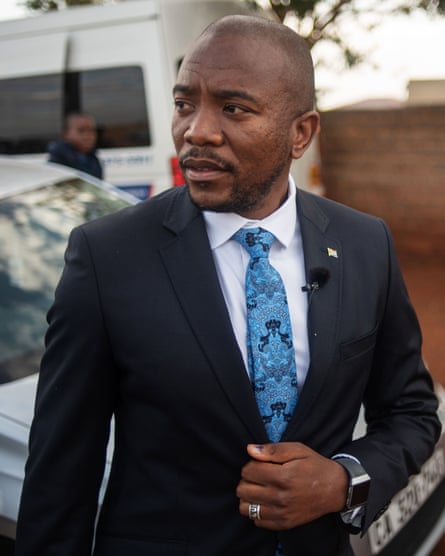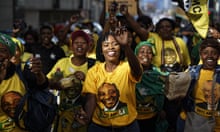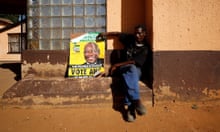Early results in South Africa’s general election suggest the ruling African National Congress party (ANC) is heading for a historic low but with enough votes to retain power.
With three-quarters of the votes counted, the ANC was on 57%, enough for a majority but a sign President Cyril Ramaphosa has failed to slow the accelerating decline in the party’s popularity 25 years after the country’s first free elections ushered in a new democratic era.
The result, if confirmed by the final count, would be a significant blow to Ramaphosa, who took power last year after ousting his predecessor, Jacob Zuma, after a series of corruption scandals.
The party’s share of the vote has not fallen below 60% in national elections since the end of the apartheid regime in 1994.
Ramaphosa, 66, had called on voters to back his efforts to root out graft and incompetence within the ANC, and push through reforms to boost South Africa’s flagging economy.
Many South Africans have been alienated by the corruption scandals and the ANC’s continuing failure to deal with collapsing public services, soaring unemployment and high levels of violent crime. There is also rising anger at the party’s failure to hold its officials to account after graft investigations.
The ANC won 62% of the vote in 2014’s parliamentary election, down from 2009 and far short of its best result, 69% in 2004 under Thabo Mbeki. The party lost further ground in municipal elections in 2016, ceding control of key cities to the Democratic Alliance (DA).
Polls predicted the ANC would win between 55% and 62% of the vote in this election. The centre-right Democratic Alliance party (DA) party looks likely to exceed expectations with 22%, according to the current results. The far-left Economic Freedom Fighters party (EFF) seems to have significantly underperformed, with about 10% of the vote.

So far, returns indicate a turnout of about 65%, which experts say is relatively low. Poor weather across much of South Africa may be to blame.
If confirmed by later results, the high scores mark progress for the DA, which appointed its first black leader, Mmusi Maimane, in 2015.
The party made headlines with big victories in local elections in Pretoria and Johannesburg a year later and could be on track to win control in more of South Africa’s nine provinces. The party already controls Western Cape.
“Fear says to us: let’s stick with what we know; hope says: let’s bring change,” Maimane said after casting his ballot in the township of Soweto.
Though the ANC will have a majority in parliament and Ramaphosa can expect the party to vote to confirm him in office with a five-year mandate, a better result would have helped the former labour activist turned tycoon in ongoing factional fighting within the party. His supporters have said the ANC faces a “moral crisis”.
Dirk Kotzé, a professor at the University of South Africa’s political science department, said: “The higher the percentage for the ANC, the more it will give [Ramaphosa] bargaining power.”
A poor score will also make it hard for Ramaphosa to resist pressure for more radical measures to redistribute wealth within South Africa, one of the world’s most unequal countries.

A big issue has been the implementation of a 2017 ANC pledge to redistribute prime agricultural land, currently disproportionately owned by white people, who constitute less than 10% of the population. Ramaphosa has vowed to accelerate the redistribution of land to the black majority, endorsing an opposition bill to amend the constitution to make expropriation without compensation easier.
At a campaign event last week in Johannesburg, the president said there would be a step-change in the pace of reform and the economy was ready for liftoff.
But the ANC’s list of parliamentary candidates contains many hardliners who are opposed to Ramaphosa’s reformist agenda and could frustrate his initiatives in parliament.








